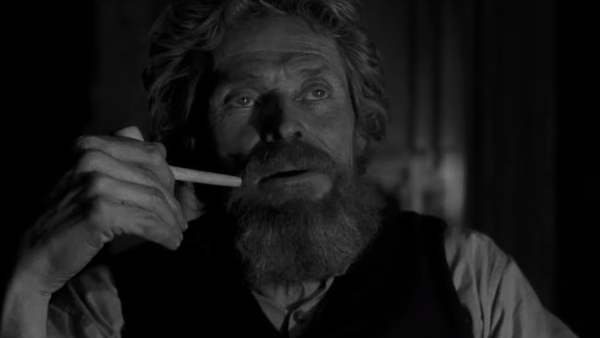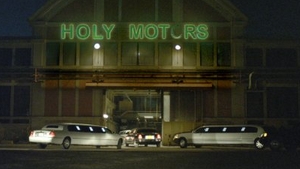 There’s no easy way to evaluate a film like Holy Motors after a single viewing. That’s why I watched my screener copy twice. Of course, I still feel somewhat behind the eight ball as I try in earnest to write my review, but in my own defense it’s worth noting that I’ve never seen anything like Holy Motors before in my life. (Continuing in that vein: I’d wager that there are more critics who share my position than not.) In fact, the film is so unique, original, and rampantly weird that calling it a new entry in surreal cinema feels like an observation of family resemblance and nothing more. How else do you categorize a film in which a deranged sewer midget bites off a woman’s fingers and kidnaps Eva Mendes in the first half an hour?
There’s no easy way to evaluate a film like Holy Motors after a single viewing. That’s why I watched my screener copy twice. Of course, I still feel somewhat behind the eight ball as I try in earnest to write my review, but in my own defense it’s worth noting that I’ve never seen anything like Holy Motors before in my life. (Continuing in that vein: I’d wager that there are more critics who share my position than not.) In fact, the film is so unique, original, and rampantly weird that calling it a new entry in surreal cinema feels like an observation of family resemblance and nothing more. How else do you categorize a film in which a deranged sewer midget bites off a woman’s fingers and kidnaps Eva Mendes in the first half an hour?
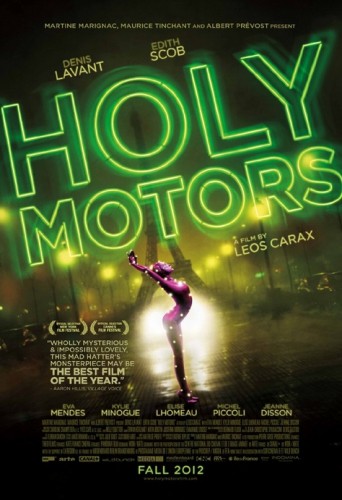 Inevitably the greater challenge of Holy Motors lies in unpacking its elements of unapologetic oddity and discovering what the film is really about. Familiarity with the life and oeuvre of director Leos Carax, at one time a helmsman of the French film movement in the eighties known as cinéma du look, could be key to understanding his film; then again, maybe all one needs to know about Carax is that he hasn’t made a feature-length film since 1999’s Pola X. If that’s the case, then Holy Motors begins with a very literal representation of his return to movies; the picture begins with Carax (in the role credited only as “Le Dormeur”) waking up in his bedroom, locating and unlocking a hidden doorway, and stepping out onto the balcony of a movie theater whose aisles are patrolled by a massive dog. And so commences our comprehension of this beautiful, tragic, bitterly funny and melancholy film.
Inevitably the greater challenge of Holy Motors lies in unpacking its elements of unapologetic oddity and discovering what the film is really about. Familiarity with the life and oeuvre of director Leos Carax, at one time a helmsman of the French film movement in the eighties known as cinéma du look, could be key to understanding his film; then again, maybe all one needs to know about Carax is that he hasn’t made a feature-length film since 1999’s Pola X. If that’s the case, then Holy Motors begins with a very literal representation of his return to movies; the picture begins with Carax (in the role credited only as “Le Dormeur”) waking up in his bedroom, locating and unlocking a hidden doorway, and stepping out onto the balcony of a movie theater whose aisles are patrolled by a massive dog. And so commences our comprehension of this beautiful, tragic, bitterly funny and melancholy film.
From the theater, Holy Motors cuts to a man (Dennis Lavant) referred to as Oscar (perhaps meant to be a sly jab at a certain Academy, perhaps an arbitrary given name), who saunters out of a massive, lavish home and climbs into a limo driven by Céline (Édith Scob). Her job is to enable him to do his; she chauffeurs him from one “appointment” to the next, where with the aid of the vehicle’s impressive stock of props and make-up, he transforms into one character after another: an old crone bemoaning her lonely fate, an assassin hired to murder his own double, a father frankly lecturing his daughter over her shyness.
Once we meet Oscar, the film plows forward with this single-minded conceit without ever looking back; he becomes our only through-line, our only constant through every costume change Carax commands. This is transgressive cheekiness at its finest, a manipulation of the traditions of cinema that Carax manufactures by so blurring the dividing lines between what’s real and what’s fabricated that they disappear entirely. Do we ever see the real Oscar? Perhaps in the quiet moments in the limo as Céline ushers him across Paris we begin getting to know him, but Holy Motors interrupts even these precious interludes of reality to put him to his strange work. So the identity Oscar comes to possess is colored by fatigue: he’s a man run ragged by his profession and grown wary of the path his craft is taking.
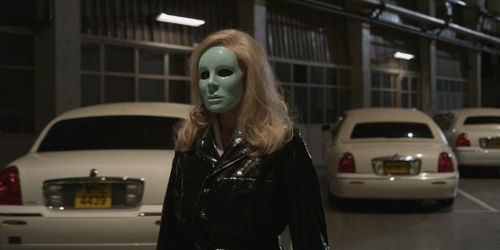 By virtue of Oscar’s avocation, it’s tempting to view Holy Motors as a production of the “movies that celebrate movies” persuasion. There’s nothing strictly incorrect with that view, either– watching Holy Motors in all of its absurd glory, we’re frequently reminded of the pure joy that we derive from watching the birth of a world through the filter of a lens and the movements of a skilled performer. Yet the tone here falls on the side of lamentation as much as jubilation. Unlike last year’s The Artist, a film that lauds the power of the studio and the gifts of the actor, Holy Motors feels at times like a funeral dirge mourning the passing of a cinematic era and a tale of how changing times fall heavy on the shoulders of the working man.
By virtue of Oscar’s avocation, it’s tempting to view Holy Motors as a production of the “movies that celebrate movies” persuasion. There’s nothing strictly incorrect with that view, either– watching Holy Motors in all of its absurd glory, we’re frequently reminded of the pure joy that we derive from watching the birth of a world through the filter of a lens and the movements of a skilled performer. Yet the tone here falls on the side of lamentation as much as jubilation. Unlike last year’s The Artist, a film that lauds the power of the studio and the gifts of the actor, Holy Motors feels at times like a funeral dirge mourning the passing of a cinematic era and a tale of how changing times fall heavy on the shoulders of the working man.
The film flits back and forth between these two modes with a lyrical, poetic ease that cuts through the vagaries of the plot. Not to say that Holy Motors reserves any sense of shame for its wanton quirkiness– this is a picture that very much embraces its eccentricities and thrives on them– but Carax bids these elements to unfold as they do in service to grander ideas, and possibly something much more personal. After a point, questions arise about how much the scenarios Oscar carries out are simply random displays of unbridled and sometimes profane silliness, and how much they actually represent some kind of catharsis for Carax, a man for whom the last thirteen years have been characterized by numerous false starts, the contribution of a short vignette in the omnibus film Tokyo! (in which Levant plays the same demented leprechaun character, Monsieur Merde, as he does here in his segment with Mendes), and the loss of his partner and mother of his child.
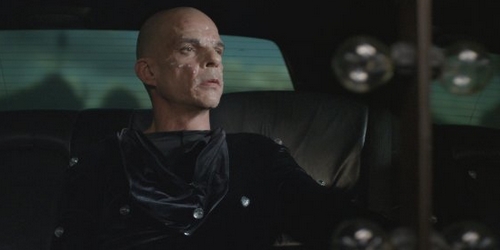 To speak further of the details of Carax’s life would feel gauche (and require an intimate familiarity with the man which I lack). Besides that, what Carax put in and got out of Holy Motors shouldn’t at all inform how we react to the film as individuals. Is Oscar merely playing a part in the heartfelt bedside melodrama that unfolds between a dying man and his niece? Who is he playing it for? What does he get out of his job? What about Céline? Together, the duo strive to enact mimicries of life– or in the case of the aforementioned Monsieur, rank freakishness– but rare are the times when anyone notices their efforts or even their presence. So the big question of Holy Motors becomes apparent rather quickly: why?
To speak further of the details of Carax’s life would feel gauche (and require an intimate familiarity with the man which I lack). Besides that, what Carax put in and got out of Holy Motors shouldn’t at all inform how we react to the film as individuals. Is Oscar merely playing a part in the heartfelt bedside melodrama that unfolds between a dying man and his niece? Who is he playing it for? What does he get out of his job? What about Céline? Together, the duo strive to enact mimicries of life– or in the case of the aforementioned Monsieur, rank freakishness– but rare are the times when anyone notices their efforts or even their presence. So the big question of Holy Motors becomes apparent rather quickly: why?
G-S-T RULING:
But even though their audience goes unseen, it exists. Maybe their only audience is us; maybe the (presumable) studio suit Oscar meets in his limo halfway through the film is meant to represent us, or at least our concerns. Then again, the point might not be performing for anyone, but rather performing for the sake of performing. And even after saying all of this, I’ve still only nicked Holy Motor‘s gorgeous, sumptuous, eye-popping, unrestrained, impassioned, wholly bizarre surface. This may be Carax’s masterpiece, and it is undoubtedly one of the most strikingly one-of-a-kind movies you’ll see this year, so I can only urge you to see it and process it for yourself. No matter where you fall, you won’t be disappointed.

